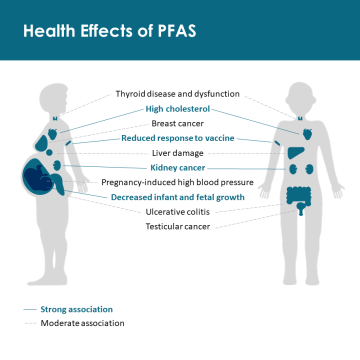PFAS & How They Affect Health
PFAS (Perfluoroalkyl and polyfluoroalkyl substances) are a large group of human-made chemicals. They can affect your health at low levels and can accumulate in your body over time. They’ve been used for over 50 years and are in many everyday products.
These chemicals don’t break down easily and are now common in our environment. It’s important to limit your exposure as much as possible to protect your health.

How could PFAS affect my health?
Most people are exposed to a mixture of PFAS chemicals. Not all PFAS chemicals stay in the body for the same amount of time or have the same toxicity. More research is needed to know what levels of PFAS cause health effects.
Current research shows PFAS exposure may cause:
- Thyroid disease and dysfunction
- High cholesterol
- Breast cancer
- Reduced response to vaccines
- Liver damage
- Kidney cancer
- Pregnancy-induced high blood pressure
- Decreased infant and fetal growth
- Ulcerative colitis
- Testicular cancer
How am I exposed to PFAS?
Almost everyone has been exposed to PFAS from the environment or using products that have PFAS. Most exposure happens when you’re eating or drinking. It is impossible to avoid some exposure to PFAS. It can happen through:
- Drinking contaminated municipal water or private well water
- Eating food grown or raised near places that used or made PFAS
- Eating fish caught from water contaminated by PFAS
- Accidentally swallowing PFAS contaminated soil or dust
- Eating food packaged in material that contains PFAS
- Accidentally swallowing residue or dust from PFAS-containing consumer products like stain resistant carpeting and water repellent clothing.
How can I reduce my exposure to PFAS?
It’s hard to avoid exposure to low levels of PFAS. Reduce or limit your exposure when you can, making drinking water and food your priority. Some PFAS leaves the body slowly over time. Limiting your exposure can reduce the levels of PFAS in your body.


